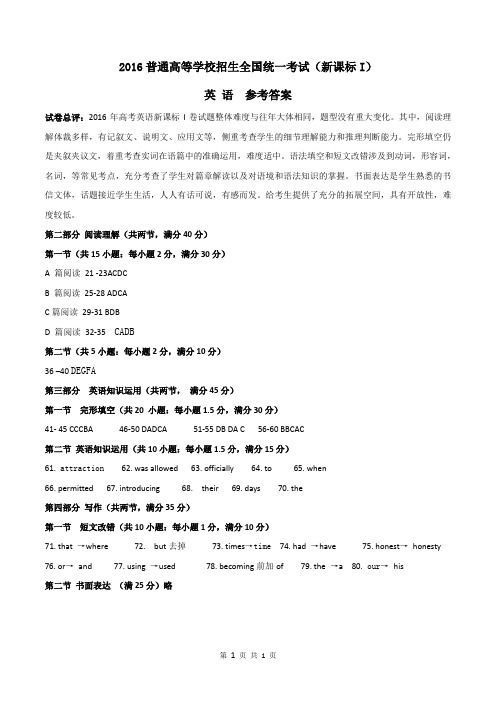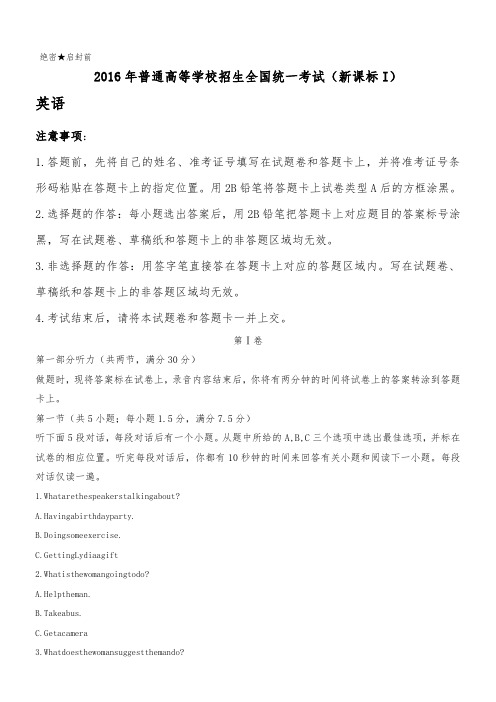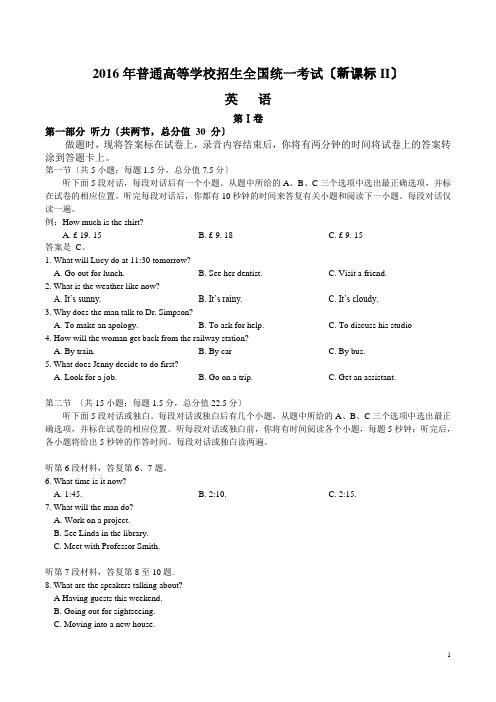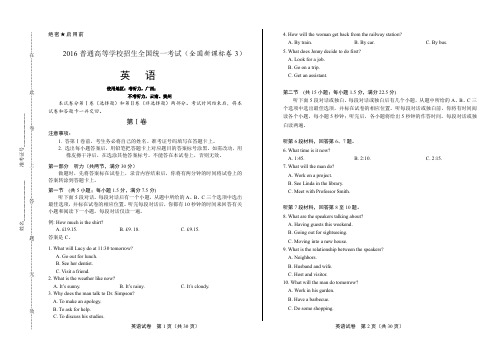【高考试卷】2016年全国高考英语试题(上海卷)★答案
2016年高考全国3卷英语试题(含答案)

2016年高考全国3卷英语试题(含答案)DA. It’s sunny.B. It’s rainy.C. It’s cloudy.3. Why does the man talk to Dr. Simpson?A. To make an apology.B. To ask for help.C. To discuss his studies.4. How will the woman get back from the railway station?A. By train.B. By car.C. By bus.5. What does Jenny decide to do first?A. Look for a job.B. Go on a trip.C. Get an assistant.第二节(共15小题;每小题1.5分,满分22.5分)听下面5段对话或独白。
每段对话或独白后有几个小题,从题中所给的A、B、C三个选项中选出最佳选项,并标在试卷的相应位置。
听每段对话或独白前,你将有时间阅读各个小题,每小题5秒钟;听完后,各小题将给出5秒钟的作答时间。
每段对话或独白读两遍。
听第6段材料,回答第6、7题。
6. What time is it now?A. 1:45.B. 2:10.C. 2:15.7. What will the man do?A. Work on a project.B. See Linda in the library.C. Meet with Professor Smith.听第7段材料,回答第8至10题。
8. What are the speakers talking about?A Having guests this weekend.B. Going out for sightseeing.C. Moving into a new house.9. What is the relationship between the speakers?A. Neighbors.B. Husband and wife.C. Host and visitor.10. What will the man do tomorrow?A. Work in his garden.B. Have a barbecue.C. Do some shopping.听第8段材料,回答第11至13题。
2016高考英语试题(新课标I)-全国卷1(乙卷)-参考答案

2016普通高等学校招生全国统一考试(新课标I)英语参考答案试卷总评:2016年高考英语新课标I卷试题整体难度与往年大体相同,题型没有重大变化。
其中,阅读理解体裁多样,有记叙文、说明文、应用文等,侧重考查学生的细节理解能力和推理判断能力。
完形填空仍是夹叙夹议文,着重考查实词在语篇中的准确运用,难度适中。
语法填空和短文改错涉及到动词,形容词,名词,等常见考点,充分考查了学生对篇章解读以及对语境和语法知识的掌握。
书面表达是学生熟悉的书信文体,话题接近学生生活,人人有话可说,有感而发。
给考生提供了充分的拓展空间,具有开放性,难度较低。
第二部分阅读理解(共两节,满分40分)第一节(共15小题:每小题2分,满分30分)A 篇阅读21 -23ACDCB 篇阅读25-28 ADCAC篇阅读29-31 BDBD 篇阅读32-35 CADB第二节(共5小题:每小题2分,满分10分)36 –40 DEGFA第三部分英语知识运用(共两节,满分45分)第一节完形填空(共20 小题:每小题1.5分,满分30分)41- 45 CCCBA 46-50 DADCA 51-55 DB DA C 56-60 BBCAC第二节英语知识运用(共10小题:每小题1.5分,满分15分)61. attraction62. was allowed 63. officially 64. to 65. when66. permitted 67. introducing 68. their 69. days 70. the第四部分写作(共两节,满分35分)第一节短文改错(共10小题:每小题1分,满分10分)71. that →where 72. but去掉73. times→time74. had →have 75. honest→honesty 76. or→and 77. using →used 78. becoming前加of 79. the →a 80. our→his第二节书面表达(满25分)略第1页共1 页。
2016年全国卷高考英语试题及答案-全国卷1

绝密★启封前2016年普通高等学校招生全国统一考试(新课标I)英语注意事项:1.答题前,先将自己的姓名、准考证号填写在试题卷和答题卡上,并将准考证号条形码粘贴在答题卡上的指定位置。
用2B铅笔将答题卡上试卷类型A后的方框涂黑。
2.3.4.做题时,卡上。
听下面5并标在A.Havingabirthdayparty.B.Doingsomeexercise.C.GettingLydiaagift2.Whatisthewomangoingtodo?A.Helptheman.B.Takeabus.C.Getacamera3.Whatdoesthewomansuggestthemando?A.TellKatetostop.B.CallKate,sfriends.C.StayawayfromKate.4.Wheredoestheconversationprobablytakeplace?A.Inawineshop.B.Inasupermarket.C.Inarestaurant.听第6听第7C.Roommates.9.WhatdoesFrankplantodorightaftergraduation?A.Workasaprogrammer.B.Travelaroundtheworld.C.Starthisownbusiness.第二节(共15小题;每小题1.5分,满分22.5分)听下面5段对话或独白。
每段对话或独白后有几个小题,从题中所给的A、B、C三个选项中选出最佳选项,并标在试卷的相应位置。
听每段对话或独白前,你将有时间阅读各个小题,每小题5秒钟;听完后,各小题将给出5秒钟的作答时间。
每段对话或独白读两遍。
听第8段材料,回答第10至12题10.Whydoesthewomanmakethecall?A.Tobookahotelroom.B.ToaskabouttheroomserviceC.Tomakechangestoareservation11.Whenwillthewomenarriveatthehotel?听第9听第1018.Whatdoesthespeakersayaboutthecollegejobmarketthisyear?A.It’sunpredictableB.It’squitestableC.It’snotoptimistic19.Whatpercentageofstudentjobseekershavefoundajobbynow?A.20%B.22%C.50%20.Whyareengineeringgraduatesmorelikelytoacceptajob?A.TheyneedmoreworkexperienceB.ThesalaryisusuallygoodC.Theirchoiceislimited.第一部分阅读理解(共两节,满分40分)第一节(共15小题:每小题2分,满分30分)阅读下列短文,从每题所给的四个选项(A、B、C和D)中选出最佳选项,并在答题卡上将该项涂黑。
2016年高考英语全国2卷试题及答案(-word)

2016年普通高等学校招生全国统一考试〔新课标II〕英语第Ⅰ卷第一部分听力〔共两节,总分值30 分〕做题时,现将答案标在试卷上,录音内容结束后,你将有两分钟的时间将试卷上的答案转涂到答题卡上。
第一节〔共5小题;每题1.5分,总分值7.5分〕听下面5段对话,每段对话后有一个小题。
从题中所给的A、B、C三个选项中选出最正确选项,并标在试卷的相应位置。
听完每段对话后,你都有10秒钟的时间来答复有关小题和阅读下一小题。
每段对话仅读一遍。
例:How much is the shirt?A. £ 19. 15B. £ 9. 18C. £ 9. 15答案是C。
1. What will Lucy do at 11:30 tomorrow?A. Go out for lunch.B. See her dentist.C. Visit a friend.2. What is the weather like now?A. It’s sunny.B. It’s rainy.C. It’s cloudy.3. Why does the man talk to Dr. Simpson?A. To make an apology.B. To ask for help.C. To discuss his studio4. How will the woman get back from the railway station?A. By train.B. By carC. By bus.5. What does Jenny decide to do first?A. Look for a job.B. Go on a trip.C. Get an assistant.第二节〔共15小题;每题1.5分,总分值22.5分〕听下面5段对话或独白。
每段对话或独白后有几个小题,从题中所给的A、B、C三个选项中选出最正确选项,并标在试卷的相应位置。
2016年高考英语全国卷I完形填空真题(含详解答案)

2016年高考英语全国卷I完形填空真题(含详解答案)DB. colleaguesC. employersD. customers43. A. SinceB. AlthoughC. AsD. If44. A. eachB. anotherC. thatD. his45. A. flamesB. smokeC. waterD. steam46. A. usedB. disabledC. removedD. abandoned47. A. got hold ofB. preparedC. took charge ofD. controlled48. A. came downB. came throughC. came inD. came over49. A. returnedB. receivedC. madeD. confirmed50. A. thenB. againC. finallyD. even51. A. StartingB. ParkingC. PassingD. Approaching52. A. quietB. stillC. awayD. calm53. A.forB. soC. andD. but54. A. explodeB. slip awayC. fall apartD. crash55. A. as ifB. unlessC. in caseD. after56. A. stepped forwardB. backed offC. moved onD. set out57. A. womanB. policeC. manD. driver58. A. forbiddenB. readyC. askedD. free59. A. for certainB. for considerationC. reportedD. checked60. A. patienceB. skillsC. effortsD. promise【答案和解析】41. C 解析:travel along 开车行进。
2016年高考英语全国卷3(含详细答案)

英语试卷 第1页(共30页)英语试卷 第2页(共30页)绝密★启用前 2016普通高等学校招生全国统一考试(全国新课标卷3)英语使用地区:考听力,广西;不考听力,云南、贵州本试卷分第Ⅰ卷(选择题)和第Ⅱ卷(非选择题)两部分。
考试时间结束后,将本试卷和答题卡一并交回。
第Ⅰ卷注意事项:1. 答第Ⅰ卷前,考生务必将自己的姓名、准考证号码填写在答题卡上。
2. 选出每小题答案后,用铅笔把答题卡上对应题目的答案标号涂黑。
如需改动,用橡皮擦干净后,在选涂其他答案标号。
不能答在本试卷上,否则无效。
第一部分 听力(共两节,满分30分)做题时,先将答案标在试卷上,录音内容结束后,你将有两分钟的时间将试卷上的答案转涂到答题卡上。
第一节 (共5小题;每小题1.5分,满分7.5分)听下面5段对话。
每段对话后有一个小题,从题中所给的A 、B 、C 三个选项中选出最佳选项,并标在试卷的相应位置。
听完每段对话后,你都有10秒钟的时间来回答有关小题和阅读下一小题。
每段对话仅读一遍。
例: How much is the shirt? A. £19.15. B. £9. 18. C. £9.15.答案是C 。
1. What will Lucy do at 11:30 tomorrow?A. Go out for lunch.B. See her dentist.C. Visit a friend.2. What is the weather like now? A. It’s sunny. B. It’s rainy.C. It’s cloudy.3. Why does the man talk to Dr. Simpson? A. To make an apology. B. To ask for help.C. To discuss his studies.4. How will the woman get back from the railway station? A. By train.B. By car.C. By bus.5. What does Jenny decide to do first? A. Look for a job. B. Go on a trip. C. Get an assistant.第二节 (共15小题;每小题1.5分,满分22.5分)听下面5段对话或独白。
2016年英语高考试题新课标Ⅱ卷(含答案解析)
2016年普通高等学校招生全国统一考试(新课标Ⅱ卷)英语第二部分阅读理解(共两节,满分40分)第一节(共15题:每小题2分,满分30分)阅读下列短文,从每题所给的四个选项(A、B、C和D)中,选出最佳选项,并在答题卡上将该项涂黑。
AWhat’s On?Electric Underground7.30pm-1.00am Free at the Cyclops TheatreDo you know who’s playing in your area? We’re bringing you an evening of live rock and pop music from the best local bands. Are you interested in becoming a musician and getting a recording contract(合同)? If so, come early to the talk at 7.30pm by Jules Skye, a successful record producer. He’s going to talk about how you can find the right person to produce you music.Gee Whizz8.30pm-10.30pm Comedy at KaleidoscopeCome and see Gee Whizz perform. He’s the funniest stand-up comedian on the comedy scene. This joyful show will please everyone, from the youngest to the oldest. Gee Whizz really knows how to make you laugh! Our bar is open from 7.00pm for drinks and snacks(快餐).Simon’s Workshop5.00pm-7.30pm Wednesdays at Victoria StageThis is a good chance for anyone who wants to learn how to do comedy. The workshop looks at every kind of comedy, and practices many different ways of making people laugh. Simon is a comedian and actor who has 10 years’ experience of teaching comedy. His workshops are exciting and fun. An evening with Simon will give you the confidence to be funny.Charlotte Stone8.00pm-11.00pm Pizza WorldFine food with beautiful jazz music; this is a great evening out. Charlotte Stone will perform songs from her new best-selling CD, with James Pickering on the piano. The menu is Italian, with excellent meat and fresh fish, pizzas and pasta(面食). Book early to get a table. Our bar is open all day, and serves cocktails, coffee, beer, and white wine.1. Who can help you if you want to have your music produced?A. Jules Skye.B. Gee Whizz.C. Charlotte Stone.D. James Pickering.2. At which place can people of different ages enjoy a good laugh?A. The Cyclops TheatreB. KaleidoscopeC. Victoria StageD. Pizza World3. What do we know about Simon’s Workshop?A. It requires membership status.B. It lasts three hours each time.C. It is run by a comedy club.D. It is held every Wednesday.4. When will Charlotte Stone perform her songs?A. 5.00pm-7.30pm.B. 7.30pm-1.00am.C. 8.00pm-11.00pm.D. 8.30pm-10.30pm.【答案】1.A 2. B 3. D 4. C【解析】2.B 细节理解题。
2016年高考英语全国1卷试题及答案word版
2016 年高考英语全国1 卷试题及答案word 版绝密★启封前2016 普通高等学校招生全国统一考试(新课标I )英语试卷类型A 注意事项: 1.答题前,先将自己的姓名、准考证号填写在试题卷和答题卡上,并将准考证号条形码粘贴在答题卡上的指定位置。
用2B 铅笔将答题卡上试卷类型 A 后的方框涂黑。
2. 选择题的作答:每小题选出答案后,用2B 铅笔把答题卡上对应题目的答案标号涂黑,写在试题卷、草稿纸和答题卡上的非答题区域均无效。
3. 非选择题的作答:用签字笔直接答在答题卡上对应的答题区域内。
写在试题卷、草稿纸和答题卡上的非答题区域均无效。
4. 考试结束后,请将本试题卷和答题卡一并上交。
第I卷第一部分听力(共两节,满分30 分)做题时,现将答案标在试卷上,录音内容结束后,你将有两分钟的时间将试卷上的答案转涂到答题卡上。
第一节(共 5 小题;每小题 1.5 分,满分7.5 分)听下面 5 段对话,每段对话后有一个小题。
从题中所给的A,B,C 三个选项中选出最佳选项,并标在试卷的相应位置。
听完每段对话后,你都有10 秒钟的时间来回答有关小题和阅读下一小题。
每段对话仅读一遍。
例:How much is the shirt?A. £19.15B. 918C. 915答案是C。
1. What are the speakers talking about?1 / 15A. Having a birthday party.B. Doing some exercise.C. Getting Lydia a gift2. What is the woman going to do?A. Help the man.B. Take a bus.C. Get a camera3. What does the woman suggest the man do?A. Tell Kate to stop.B. Call Kate , s friends.C. Stay away from Kate.4. Where does the conversation probably take place?A. In a wine shop.B. In a supermarket.C. In a restaurant.5. What does the woman mean?A. Keep the window closed.B. Go out for fresh air.C. Turn on the fan. 听第6 段材料,回答第6、7 题。
2016年全国2卷高考英语试题及答案(整理后)
Five years ago, when I taught art at a school in Seattle, I used Tinkertoys as a test at the beginning of a term to find out something about my students. I put a small set of Tinkertoys in front of each student, and said:”Make something out of the Tinkertoys. You have45 minutes today - and 45minutes each day for the rest of the week.”A few students hesitated to start. They waited to see the rest of the class would do. Several others checked the instructions and made something according to one of the model plans provided. Another group built something out of their own imaginations.Once I had a boy who worked experimentally with Tinkertoys in his free time. His constructions filled a shelf in the art classroom and a good part of his bedroom at home. I was delighted at the presence of such a student. Here was an exceptionally creative mind at work. His presence meant that I had an unexpected teaching assistant in class whose creativity would infect(感染) other students.Encouraging this kind of thinking has a downside. I ran the risk of losing those students who had a different style of thinking. Without fail one would declare,” But I’m just not creative.”“Do you dream at night when you’re asleep?”“Oh, sure.”“So tell me one of your most interesting dreams.” The student would tell something wildly imaginative. Flying in the sky or in a time machine or growing three heads. “That’s pretty creative. Who does that for you?”“Nobody. I do it.”“Really-at night, when you’re asleep?”“Sure.”“Try doing it in the daytime, in class, okay?”25. The teacher used Tinkertoys in class in order to ________?A. know more about the studentsB. make the lessons more excitingC. raise the students’ interest in artD. teach the students about toy design26. What do we know about the boy mentioned in Paragraph 3?A. He liked to help his teacher.B. He preferred to study alone.C. He was active in class.D. He was imaginative.27. What does the underlined word “downside” in Paragraph 4 probabl y mean?A. Mistake.B. Drawback.C. Difficulty.D. Burden.28. Why did the teacher ask the students to talk about their dreams?A. To help them to see their creativity.B. To find out about their sleeping habits.C. To help them to improve their memory.D. To find out about their ways of thinking.CReading can be a social activity. Think of the people who belong to book groups. They choose books to read and then meet to discuss them. Now, the website turns the page on the traditional idea of a book group.Members go on the site and register the books they own and would like to share. BookCrossing provides an identification number to stick inside the book. Then the person leaves it in a public place, hoping that the book will have an adventure, traveling far and wide with each new reader who finds it.Bruce Pederson, the managing director of BookCrossing, says, “The two things that change your life are the people you meet an d books you read. BookCrossing combines both.”Members leave books on park benches and buses, in train stations and coffee shops. Whoever finds their book will go to the site and record where they found it.People who find a book can also leave a journal entry describing what they thought of it. E-mails are then sent to the BookCrossing to keep them updated about where their books have been found. Bruce peterson says the idea is for people not to be selfish by keeping a book to gather dust on a shelf at home.BookCrossing is part of a trend among p eople who want to get back to the “real” and not the virtual(虚拟). The site now has more than one million members in more than one hundred thirty-five countries.29. Why does the author mention book groups in the first paragraph?A. To explain what they are.B. To introduce BookCrossing.C. To stress the importance of reading.D. To encourage readers to share their ideas.30. What does the underlined word “it” in Paragraph 2refer to?A. The book.B. An adventure.C. A public place.D. The identification number.31. What will a BookCrosser do with a book after reading it?A. Meet other readers to discuss it.B. Keep it safe in his bookcase.C. Pass it on to another reader.D. Mail it back to its owner.32. What is the best title for the text?A. Online Reading: A Virtual TourB. Electronic Books: A new TrendC. A Book Group Brings Tradition BackD. A Website Links People through BooksDA new collection of photos brings an unsuccessful Antarctic voyage back to life.Frank Hurl ey’s pictures would be outstanding----undoubtedly first-rate photo-journalism---if they had been made last week. In fact, they were shot from 1914 through 1916, most of them after a disastrous shipwreck(海滩), by a cameraman who had no reasonable expectation of survival. Many of the images were stored in an ice chest, under freezing water, in the damaged wooden ship.The ship was the Endurance, a small, tight, Norwegian-built three-master that was intended to take Sir Ernest Shackleton and a small crew of s eamen and scientists, 27 men in all, to the southernmost shore of Antarctica’s Weddell Sea. From that point Shackleton wanted to force a passage by dog sled(雪橇) across the continent. The journey was intended to achieve more than what Captain Robert Falcon Scott had done. Captain Scott had reached the South Pole early in 1912 but had died with his four companions on the march back.As writer Caroline Alexander makes clear in her forceful and well-researched story The Endurance, adventuring was even then a thoroughly commercial effort. Scott’s last journey, completed as be lay in a tent dying of cold and hunger, caught the world’s imagination, and a film made in his honor drew crowds. Shackleton, a onetime British merchant-navy officer who had got to within 100 miles of the South Pole in 1908, started a business before his 1914 voyage to make money from movie and still photography. Frank Hurley, a confident and gifted Australian photographer who knew the Antarctic, was hired to make the images, most of which have never before been published.33. What do we know about the photos taken by Hurley?A. They were made last weekB. They showed undersea sceneriesC. They were found by a cameramanD. They recorded a disastrous adventure34. Who reached the South Pole first according to the text?A. Frank HurleyB. Ernest ShackletonC. Robert Falcon ScottD. Caroline Alexander35. What does Alexander think was the purpose of the 1914 voyage?A. Artistic creationB. Scientific researchC. Money makingD. Treasure hunting第二节(共5小题;每小题2分,满分10分)A garden that’s just right for youHave you ever visited a garden that seemed just right for you, where the atmosphere of the garden appeared to total more than the sum(总和) of its parts? 36 . But it doesn’t happen by accident. It starts with looking inside yourself and understanding who you are with respect to the natural world and how you approach the gardening process.●___37Some people may think that a garden is no more than plants, flowers, patterns and masses of color. Others are concerned about using gardening methods that require less water and fewer fertilizers(肥料). 38 . However, there are a number of other reasons that might explain why you want to garden. One of them comes from our earliest years.●Recall(回忆)your childhood memoriesOur model of what a garden should be often goes back to childhood. Grandma’s rose garden and Dad’s vegetable garden might be good or bad, but that’s not what’s important. 39 --how being in those gardens made us feel. If you’d like to build a powerful bond with your garden, start by taking some time to recall the gardens of your youth. 40 then go outside and work out a plan to translate your childhood memories into your grown-up garden. Have fun.A. Know why you gardenB. Find a good place for your own gardenC. It’s our experience of the garden that mattersD. It’s delightful to see so many beautiful flowersE. Still others may simply enjoy being outdoors and close to plantsF. You can produce that kind of magical quality in your own garden, tooG. For each of those gardens, writer down the strongest memory you have第二节(共10小题;每小题1.5分,满分15分)If you feel stressed by responsibilities at work, you should take a step back and identify (识别)those of 61 (great)and less importance. Then, handle the most important tasks first so you’ll feel a real sense of 62 (achieve). Leaving the less important things until tomorrow 63 (be) often acceptable.Most of us are more focused 64 our tasks in the morning than we are later in the day. So, get an early start and try to be as productive 65 possible before lunch. This will give you the confidence you need to get you through the afternoon and go home feeling accomplished.Recent 66 (study) show that we are far more productive at work if we take short breaks 67 (regular). Give your body and brain a rest by stepping outside for 68 while, exercising, or dong something you enjoy.If you find something you love doing outside of the office, you’ll be less likely 69 (bring) your work home. It could be anything-gardening, cooking, music, sports—but whatever it is, 70 (make) sure it’s a relief from daily stress rather than anotherthing to worry about.第三部分写作(共两节,满分35分)第一节短文改错(共10小题,每小题1分,满分10分)The summer holiday is coming. My classmates and I are talking about how to do during the holiday. We can chose between staying at home and take a trip. If we stay at home, it is comfortable but there is no need to spend money. But in that case, we will learn little about world. If we go on a trip abroad, we can broaden you view and gain knowledges we cannot get from books. Some classmates suggest we can go to places of interest nearby. I thought that it is a good idea. It does not cost many, yet we can still learn a lot.第一节完形填空(共20小题;每小题1.5分,满分30分)Hundreds of people have formed impressions of you through that little device(装置)on your desk. And they’ve never actually 41 you. Everything they know about you 42 through this device, sometimes from hundreds of miles away. 43 they feel they can know you 44 from the sound of your voice. That’s how powerful the 45 is.Powerful, yes, but not always 46 . For years I dealt with my travel agent only by phone. Rani, my faceless agent whom I’d ne ver met 47 , got me rock-bottom prices on airfares, cars, and hotels. But her cold voice really 48 me. I sometimes wished to 49 another agent.One morning, I had to 50 an immediate flight home for a family emergency. I ran into Rani’s office 51 . The woman sitting at the desk, 52 my madness, sympathetically jumped up. She gave me a 53 smile, nodded while listening patiently, and then printed out the 54 immediately. “What a wonderful lady!” I thought.Rushing out 55 I called out over my shou lder, “By the way, what’s your name?” “I’m Rani,” she said. I turned around and saw a 56 woman with a big smile on her face waving to wish me a safe trip. I was 57 ! Why had I thought she was cold? Rani was, well, so 58 .Sitting back in the car on t he way to the airport, I figured it all out. Rani’s 59 ---her warm smile, her nods, her ‘I’m here for you’ 60 ---were all silent signals that didn’t travel through wires.41. A. accepted B. noticed C. heard D. met42. A. came B. moved C. ran D. developed43. A. Thus B. Yet C. Then D. Indeed44. A. rather B. also C. just D. already45. A. Telephone B. voice C. connection D. impression46. A. direct B. useful C. easy D. accurate47. A. in person B. by myself C. in public D. on purpose48. A. annoyed B. interested C. discouraged D. confused49. A. promote B. train C. find D. know50. A. arrange B. postpone C. confirm D. book51. A. for the first time B. at any time C. from time to time D. in good time52. A. expecting B. seeing C. testing D. avoiding53. A. shy B. comforting C. familiar D. forced54. A. bill B. form C. ticket D. list55. A. hopefully B. disappointedly C. gratefully D. regretfully56. A. careful B. serious C. nervous D. pleasant57. A. amused B. worried C. helpless D. speechless58. A. calm B. nice C. proud D. clever59. A. forgiveness B. eagerness C. friendliness D. skillfulness60. A. explanation B. attitude C. concept D. Behavior2016年普通高等学校招生全国统一考试英语答案及评分参考第一部分:听力1-5 BCACB 6-10 ACABC 11-15 BACAC 16-20 BACAB第二部分:21. A 22. B 23. D 24. C 25. A26. D 27. B 28. A 29. B 30. A31. C 32. D 33. D 34. C 35. C36. F 37. A 38. E 39. C 40. G41. D 42. A 43. B 44. C 45. A46. D 47. A 48. A 49. C 50. D51. A 52. B 55. B 54. C 55. C56. D 57. D 58. B 59. C 60. B61. greater 62. achievement 63. is 64. on 65. as66. studies 67. regularly 68. a 69. to bring 70. make第三部分:第一节:The summer holiday is coming. My classmates and I are talking about how to do during the holiday. We canwhatchose between staying at home and take a trip. If we stay at home, it is comfortable but there is no need to spendchoose taking andmoney. But in that case, we will learn little about∧ world. If we go on a trip abroad, we can broaden your viewthe ourand gain knowledges we cannot get from books. Some classmates suggest we can go to places of interest nearby. I knowledge can或shouldthought that it is a good idea. It does not cost many, yet we can still learn a lot.think much第二节:一、评分原则1.本题总分为25分,按5个档次给分。
【高考必备资料】2016年全国各地高考英语真题汇总Word版含解析
【高考必备资料】2016年全国各地高考英语真题汇总2016年全国各套解析版高考英语真题页码范围如下:2016年高考真题——英语(全国Ⅰ卷)……………………第2~15页2016年高考真题——英语(全国II卷)……………………. 第16~30页2016年高考真题——英语(全国Ⅲ卷)……………………第31~44页2016年高考真题——英语(北京卷)………………………. 第45~62页2016年高考真题——英语(天津卷)………………………. 第63~70页2016年高考真题——英语(浙江卷)………………………. 第71~93页2016年高考真题——英语(四川卷)………………………. 第94~107页2016年高考真题——英语(上海卷)………………………. 第108~125页绝密★启用前2016年普通高等学校招生全国统一考试(全国Ⅰ卷)英语(考试时间:120分钟试卷满分:150分)注意事项:1.答题前,先将自己的姓名、准考证号填写在试题卷和答题卡上,并将准考证号条形码粘贴在答题卡上的指定位置。
用2B铅笔将答题卡上试卷类型A后的方框涂黑。
2.选择题的作答:每小题选出答案后,用2B铅笔把答题卡上对应题目的答案标号涂黑,写在试题卷、草稿纸和答题卡上的非答题区域均无效。
3.非选择题的作答:用签字笔直接答在答题卡上对应的答题区域内。
写在试题卷、草稿纸和答题卡上的非答题区域均无效。
4.考试结束后,请将本试题卷和答题卡一并上交。
第一部分听力(共两节,满分30 分)做题时,现将答案标在试卷上,录音内容结束后,你将有两分钟的时间将试卷上的答案转涂到答题卡上。
第一节(共5 小题;每小题 1.5 分,满分7.5 分)听下面5 段对话,每段对话后有一个小题。
从题中所给的A,B,C 三个选项中选出最佳选项,并标在试卷的相应位置。
听完每段对话后,你都有10 秒钟的时间来回答有关小题和阅读下一小题。
每段对话仅读一遍。
例:How much is the shirt?A.£ 19.15B.£ 9.18C.£ 9.15答案是C。
- 1、下载文档前请自行甄别文档内容的完整性,平台不提供额外的编辑、内容补充、找答案等附加服务。
- 2、"仅部分预览"的文档,不可在线预览部分如存在完整性等问题,可反馈申请退款(可完整预览的文档不适用该条件!)。
- 3、如文档侵犯您的权益,请联系客服反馈,我们会尽快为您处理(人工客服工作时间:9:00-18:30)。
- 1 - 【高考试卷】2016年全国高考英语试题(上海卷)★答案 考生注意: 1. 考试时间120分钟, 试卷满分150分。 2. 本考试设试卷和答题纸两部分。试卷分为第I卷(第1-12页)和第II卷(第13页),全卷共13页。所有答题必须涂(选择题)或写(非选择题)在答题纸上,做在试卷上一律不得分。 答题前,务必在答题纸上填写准考证号和姓名,并将核对后的条形码贴在指定位置上,在答题纸反而清楚地填写姓名。
第I卷(共103分) I. Listening Comprehension Section A Directions: In Section A, you will hear ten short conversations between two speakers. At the end of each conversation, a question will be asked about what was said. The conversations and the questions will be spoken only once. After you hear a conversation and the question about it, read the four possible answers on your paper, and decide which one is the best answer to the question you have heard. 1. A. It is satisfactory. B. It is luxurious. C. It is old-fashioned. D. It is disappointing. 2. A. On August 5th. B. On August 6th. C. On August 7th. D. On August 8th. 3. A. A waiter. B. A butcher. C. A porter. D. A farmer. 4. A. In a theatre. B. In a library. C. In a booking office. D. In a furniture store. 5. A. She expected to a better show. B. She could hardly find her seat. C. She wasn’t interested in the show. D. She didn’t get a favourable seat. 6. A. The woman often eats out for breakfast. B. The cafeteria serves good breakfast. C. The woman doesn’t have breakfast. D. The cafeteria doesn’t serve breakfast. 7. A. Selling cucumbers. B. Planting vegetables. C. Cooking a meal. D. Picking tomatoes. 8. A. The man should work hard. B. The man should turn down the job offer. C. The man may have another chance. D. The man can apply for the job again. 9. A. It is a hot and smoggy day. B. There is a traffic jam on King Street. C. A vehicle is polluting the air. D. The man is reading a report online. 10. A. Its ending is not good enough. B. Its special effects are not satisfying. C. It deserves an award. D. It is good except for the scary part. Section B Directions: In Section B, you will hear two short passages, and you will be asked three questions on each of the passages. The passages will be read twice, but the questions will be spoken only once. When you hear a question, read the four possible answers on your paper and decide which one would be the best answer to the question you have heard. Questions 11 through 13 are based on the following passage. 11. A. $1. B. $2 C. $3 D. $ 52. 12. A. Pay the bills first. B. Spend 2% of the salary on living expenses. - 2 -
C. Deposit $1000 every month. D. Put part of the money in a savings account. 13. A. Methods of saving money. B. Saving money for family emergencies. C. The importance of saving money. D. Secrets of spending money wisely. Questions 14 through 16 are based on the following passage. 14. A. Free education. B. A sum of money. C. Donations from a local newspaper. D. Gifts from many people. 15. A. Let students in before school. B. Offer ice cream and coffee. C. Introduce a bank into the campus. D. Reduce the traffic jams around. 16. A. It lacks positive news. B. It should grow into a big city. C. It is a place worth living in. D. It remains peaceful and quiet. Section C Directions: In section C, you will hear two longer conversations. The conversations will be read twice. After you hear each conversation, you are required to fill in the numbered blanks with the information you have heard. Write your answers on your answer sheet. Blanks 17 through 20 are based on the following conversation. Complete the form. Write ONE WORD for each answer. Class Diary (June 13-19)
□13SUN
□14MON 17 for after-class activity application
□15TUE
□16WED Handing in three student 18
□17THU
Basketball Club meeting
Time:12:45—1:30pm Place: The 19
□18FRI
Filling in a form with up-to-date personal data
Time: 20 break Place: The computer room
□19SAT
Blank 21 through 24 are based on the following conversation. Complete the form. Write NO MORE THAN THREE WORDS for each answer. - 3 -
Who is Sue Walter? She is 21 in court and a writer. What is Sue’s suggestion for people with difficulties? 22 In Sue’s eyes, what is the best part about her job? 23 in decision-making. What does Sue think happiness is? 24 II. Grammar and Vocabulary Section A Directions: After reading the passages below, fill in the blanks to make the passages coherent and grammatically correct. For the blanks with a given word, fill in each blank with the proper form. of the given word; for the other blanks, use one word that best fits each blank. (A) Bags of Love Last year, I was assigned to work at an office near my mother’s house, so I stayed with her for a month. During that time, I helped out with the housework and contributed to the groceries. After less than a week, I started noticing that the groceries were running out pretty quickly — we were always suddenly out of something. (25)_______(wonder) how my mum could consume them so quickly, I began observing her daily routine for two weeks. To my surprise, I found that she would pack a paper bag full of canned goods and head out every morning at about nine. Eventually, I decided to follow her and (26)_______ happened truly amazed me. She was taking the food to the refugee camp, in (27)______ she distributed it to children. I asked around and found out that my mum was very well known in the area. The kids were very friendly with her and even looked up to her as if she were their own mother. Then it hit me —why would she not want to tell me about what she (28)_____(do)? Was she worried about how I would react or that I would stop (29)_____(buy) the groceries if I found out? When she got home, I told her about my discovery. (30)_____ she could react, I gave her a big hug and told her she didn’t need to keep it a secret (31)______ me. She told me that some of the children lived with an older lady in a shelter while others slept on the streets. For years, my mum has been helping out by giving them whatever food she could spare. I was so impressed by (32)_____ selfless she was. 【答案】 25. Wondering 26. what 27. which 28. had done 29. buying 30. Before 31. from 32. how 【解析】 试题分析:本文属于记叙文,我在无意中发现妈妈偷偷地帮助难民,赞美了妈妈善良无私的美丽品质。 25. Wondering 考查现在分词做状语。动词wonder与本句主语I构成主动关系,所以使用现在分词wondering在句中做状语。 26. what 考查主语从句。本句中连接代词what引导主语从句what happened,并在句中做主语。句意:发生的事情真得让我很惊讶。
